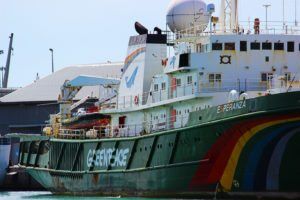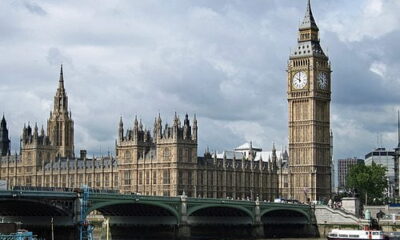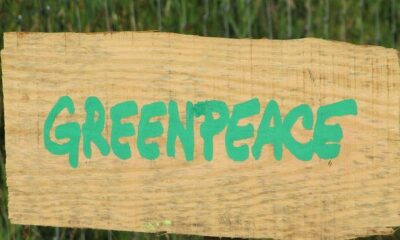

Environment
BP’s Removal From Great Australian Bight Is Welcomed By Environmental Organisations
Nathaniel Pelle, Greenpeace Australia Pacific Oceans Campaigner, has commented on BP’s actions to abandon its oil exploration program in the Great Australian Bight:
“This is a welcome move from BP, who should never have considered drilling for oil in such a pristine wilderness in the first place.
“This news will be especially welcomed by the local communities near the waters of the Great Australian Bight like the tourism operators, oyster farmers and fishers who rely on it for their livelihoods.
“Malcolm Turnbull should now heed this signal from BP, stop further oil exploration in the Great Australian Bight for good, and protect this unique wilderness while he still can.
“Other companies such as Chevron, Bight Petroleum, Santos and Murphy are still eyeing the Great Australian Bight and have exploration permits. They should take the lead from BP, pack up their bags and go home.
“It’s clear that the age of oil is over, and that BP should cancel all frontier oil projects worldwide. It’s time for corporations like BP to steer clear of all extreme oil provinces as we transition away from fossil fuels forever.”
Carbon Tracker Initiative
Andrew Grant, senior oil & gas analyst at the Carbon Tracker Initiative, said:
“Even if drilling in the Great Australian Bight had been successful, production would most likely have been high-cost and many years into the future. Such frontier exploration projects are obvious cancellation candidates at a time when companies are focusing on capital discipline.”
“This decision makes both economic and climate sense from an investor perspective. More oil and gas companies should follow BP’s lead and avoid throwing cash at projects that are unneeded as the world transitions away from fossil fuels. Instead companies should align their portfolios and investment plans with a 2 degree target that prioritises shareholder returns, and stick with a value over volume approach even as prices rise.”
ShareAction welcomes BP’s U-turn on Great Australian Bight project
ShareAction has welcomed BP’s decision not to proceed with plans to drill for oil in the Great Australian Bight, offshore South Australia.
Earlier this year, ShareAction wrote and distributed an investor briefing to over 100 investors globally outlining the operational, economic and reputational risks of the project, ahead of the company’s AGM.
ShareAction then worked with allies in the investment community and in civil society to ensure that the company’s risky plans in Australian deep water were the subject of numerous tough questions at the AGM. The level of shareholder concern expressed caused CEO Bob Dudley to remark during the AGM: ‘Well, this investment in Australia is not popular today.’
Catherine Howarth, Chief Executive at ShareAction said:
“BP’s new strategy of constrained growth is good news for shareholders, and the company’s decision to retreat completely from Australian deep water projects suggests the company’s intentions are genuine. We are delighted to have helped bring this issue to the attention of the investor community, and ultimately to the board of the company. The board listened to shareholder concerns, and is to be applauded for that.”
“Pension savers in the UK remain highly exposed to the oil and gas sector, and ShareAction wants to see much stronger evidence that pension schemes understand and are acting to reduce the risks presented by that exposure following the Paris Climate Agreement last December.”
Greenpeace UK
Charlie Kronick, of Greenpeace UK said:
“BP’s forced withdrawal from the Great Australian Bight is another nail in coffin for big oil. The case for opening up new fossil fuel reserves in high-risk environments is crumbling before our eyes under the weight of environmental, climate and economic concerns. The reality is that the future of energy won’t be pumped out of the deep water off Southern Australia, the Norwegian Arctic or the Canadian tar sands – literally the ends of the earth, where drilling is expensive, difficult or dangerous, and is usually all three. We’re facing some touch challenges, from preventing catastrophic climate change to cleaning up air pollution and avoiding the destruction of the last pristine wilderness areas on earth. Drilling for more oil isn’t the answer to any of those questions. The Great Australian Bight has avoided disaster for now, but the real challenge is to make sure these projects don’t waste millions of pounds and valuable time chasing more oil we can never use.”
The Wilderness Society of Australia:
All oil and gas companies should follow BP’s lead and leave the Great Australian Bight
Government should immediately rescind oil and gas leases and permanently protect Bight
If BP can’t produce an acceptable drilling plan, then other companies will fare no better
All remaining oil and gas companies will face increasing community opposition
All oil and gas companies should follow BP’s lead and leave the Great Australian Bight after the British petroleum giant announced today it was quitting its operations in the Bight before attempting drilling, the Wilderness Society said today.
Australia’s offshore oil and gas regulator, NOPSEMA, has sent back BP’s application to drill in the Bight three times.
“If BP with all its experience cannot produce an acceptable drilling plan for NOPSEMA, the remaining companies exploring in the Bight will be wasting their shareholders’ money trying to pursue this folly,” said Wilderness Society National Director Lyndon Schneiders.
“This decision shows that it’s too expensive to establish the significant and costly risk management and clean up capacity infrastructure needed to protect our communities from the enormous spill risks associated with drilling in this part of the world. Clearly this is a far too high cost oil basin for any oil company to consider exploiting.
“Chevron, Santos, Murphy and Karoon, which received its permit just last week, will face the same massive costs and increasing community opposition that BP experienced. We call on these companies to follow BP’s lead and leave the Bight and the communities surrounding the Bight in peace.
“The Australian Government must now recognise that deepwater exploration drilling cannot be undertaken safely in the rough waters of the Great Australian Bight, or without presenting unacceptable risks to its unique marine environment. It must now step in and terminate BP’s leases and rescind all exploration permits in the Bight Basin.
“The fact is that drilling here is far too dangerous ‑ for our environment and our communities ‑ and our Great Australian Bight needs to be permanently protected from the risks inherently associated with oil and gas exploration.
“We should not be opening up entire new oil and gas precincts when the world already has enough oil reserves ‑ let alone coal and gas reserves ‑ to take the world global temperature rise above 2 degrees Celsius, let alone the 1.5oC mark of the Paris climate agreement that has just been ratified.”
Wilderness Society South Australia Director Peter Owen said: “We should not be expanding the fossil fuel industry into pristine treacherous seas where the risk of spills is far greater than we’ve seen before. A rapid transition away from this industry is our only hope for a liveable climate.”
“The Great Australian Bight waters are deeper, more treacherous and more remote than the Gulf of Mexico, where BP was responsible for 800 million litres of oil spewing into the Gulf for 87 days in 2010. Waves in the Bight in winter are six times bigger than the waves in the Gulf of Mexico around the time of BP’s disaster. Even in summer Bight waves are four times higher.
“The Great Australian Bight’s pristine waters are a haven for 36 species of whales and dolphins, including the world’s most important nursery for the endangered southern right whale as well as many humpback, sperm, blue and beak whales. It’s also Australia’s most important sea lion nursery and supports seals, orcas, giant cuttlefish and some of Australia’s most important fisheries.
“BP’s spill modelling shows a spill from an uncontained blowout from its proposed Stromlo-1 well is guaranteed to impact the South Australian coast and could hit Port Lincoln and Kangaroo Island in 15 days and Adelaide in 20 days. The Karoon lease issued just last week is even closer to Adelaide, Kangaroo Island and Port Lincoln and its important tuna fishing industry.
“It’s time to end the dangerous fiasco of oil and gas exploration in the Great Australian Bight.
“As conservationists, we have been proud to work as part of the community to ensure that BP was never able to roll the dice off our shores and risk the oceans, beaches and marine wildlife that support our coastal industries, economies and lifestyles.”
































